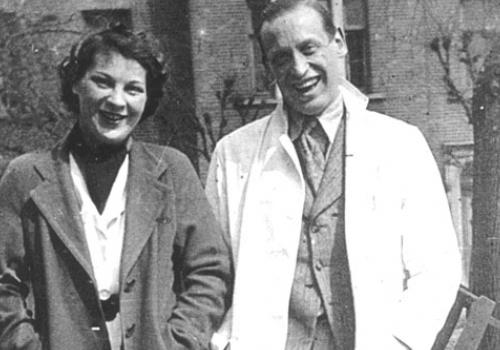John Gulliver – Campaigning spirit of Avis Hutt will be sadly missed

ONE of the most remarkable women I have known, Avis Hutt, has sadly died at the age of 92.
She had the kind of campaigning spirit that was arguably more common in the politically restless 30s and 40s than it is today.
She took part in all the great social upheavals of the last century, from the battles to stop the Fascists in the East End in the mid-30s, to the creation of the National Health Service in the late 40s, and she later marched against nuclear weapons.
She came from the humblest beginning – left as a foundling on the steps of a London poorhouse.
Avis often said: “I came from nowhere so everything that follows is a boon!”
In the 30s she trained as a nurse, became a radical political animal, and married a leading surgeon, Ruscoe Clarke, who had a mission to create a national health service. His campaign helped to found the NHS.
After Ruscoe’s death, Avis married Alan Hutt, a leading typographer and Communist journalist whose designs for the Daily Worker won national prizes.
They lived in a house in Regent’s Park Terrace, Camden Town; later, she settled in Primrose Hill where I got to know her.
In the 70s and 80s Avis was a senior nursing tutor at the Royal Free Hospital, and after her retirement threw herself into residents’ campaigns against developers in Primrose Hill, as well as playing a leading part in an initiative in the borough to improve the lifestyle of the elderly.
Even when she became less mobile in the last few years, Avis would often contact me to express her horror at attempts to privatise the NHS – her great love in life. To her, the NHS was sacrosanct.
A familiar figure in Primrose Hill, she was the kind of free spirit who is forever looking forward to the future.
I saw less of her in the past couple of years after she went to live with a daughter in Kentish Town because of her illness.
She died in a hospice on Monday.
• A fuller obituary will be published in the New Journal next week.
Investigating new ways to fund real journalism
WHO can best expose the corruption of public officials and politicians?
In the past this responsibility fell to newspapers. But all that largely belongs to the past. Today, many newspapers are too strapped for cash to invest in costly investigations.
In the US – where 65,000 journalists have been sacked in the past year or so because of the recession – private charitable foundations have stepped in where newspapers can no longer tread.
Gavin MacFadyen, who runs the Centre for Investigative Journalism at City University, Islington, described on Saturday how American foundations are investing millions in investigations. “Here’s the money – and we don’t want to know what you’re looking into,” seems to be their philosophy, said MacFadyen, who was addressing a conference at the Holborn HQ of the National Union of Journalists.
He revealed that his Centre had already attracted £2million for investigations in Britain from various bodies. In the 60s and 70s the Sunday Times showed what can be achieved in its exposure of the Thalidomide scandal.
I’m sure there are a lot of hidden scandals today that require to be unearthed.
A renaissance for gallery?
WILL the discovery of a lost masterpiece by Marc Chagall come to the rescue of the Ben Uri gallery in Boundary Road, West Hampstead?
It’s probably worth a few hundred thousand pounds and Ben Uri’s chairman David Glasser hopes it will help the gallery to move into a bigger space, hopefully in the West End – for lack of space is its problem.
At the moment the gallery – essentially a shop on two floors – is too small to adequately show its magnificent collection of works by Frank Auerbach, David Bomberg, Jacob Epstein, Josef Herman, and Isaac Rosenberg, to name but a few.
Last week, large queues snaked around a Mayfair gallery, anxious to see Chagall’s painting of the Jewish Christ painted in 1945 in reaction to the Holocaust.
Mr Glasser, a shrewd collector and businessman, snapped it up for £26,000 at a French auction.
‘Lowkey’ is the star turn speaking out over Gaza
THEY came to hear their “hero”, George Galloway MP, who had been thrown out of Egypt last week after trying to enter Gaza with a convoy of food and medicine.
“I’m a person non grata – and I’m very proud to be one,” declared Galloway to a cheering packed audience at Conway Hall, Holborn, on Tuesday evening.
“Mubarak [Egypt’s president] is only a tin-pot dictator.”,
But he praised Turkey as a leading player in the Middle East, positioning itself as a “friend” of the Palestinians besieged in Gaza. “We’ll see what happens in two months’ time when the Turkish navy plans to escort a convoy to Gaza,” said Galloway.
Several speakers denounced Israel for its “crimes” committed during their invasion of Gaza last year in which 1,500 people including more than 300 children were killed.
But rapper Lowkey, who spoke rhythmically with a passion rarely heard at political rallies, drew the most applause. I thought he had a point when he denounced the mainstream media in Britain for its “silence” over the plight of the Palestinians.
JOHN GULLIVER



